JIIPCC ACADEMY
Check available courses and choose your course
1
Step 1
Sign-up for any course of your choice and follow the prompt to register
2
Step 2
Watch all the videos for the courses and make atleast 60% attendance and a score of at least 60 percent in the MCQ
3
Step 3
While courses are for free, participants have the option to pay for a certificate for $20 or N20,000
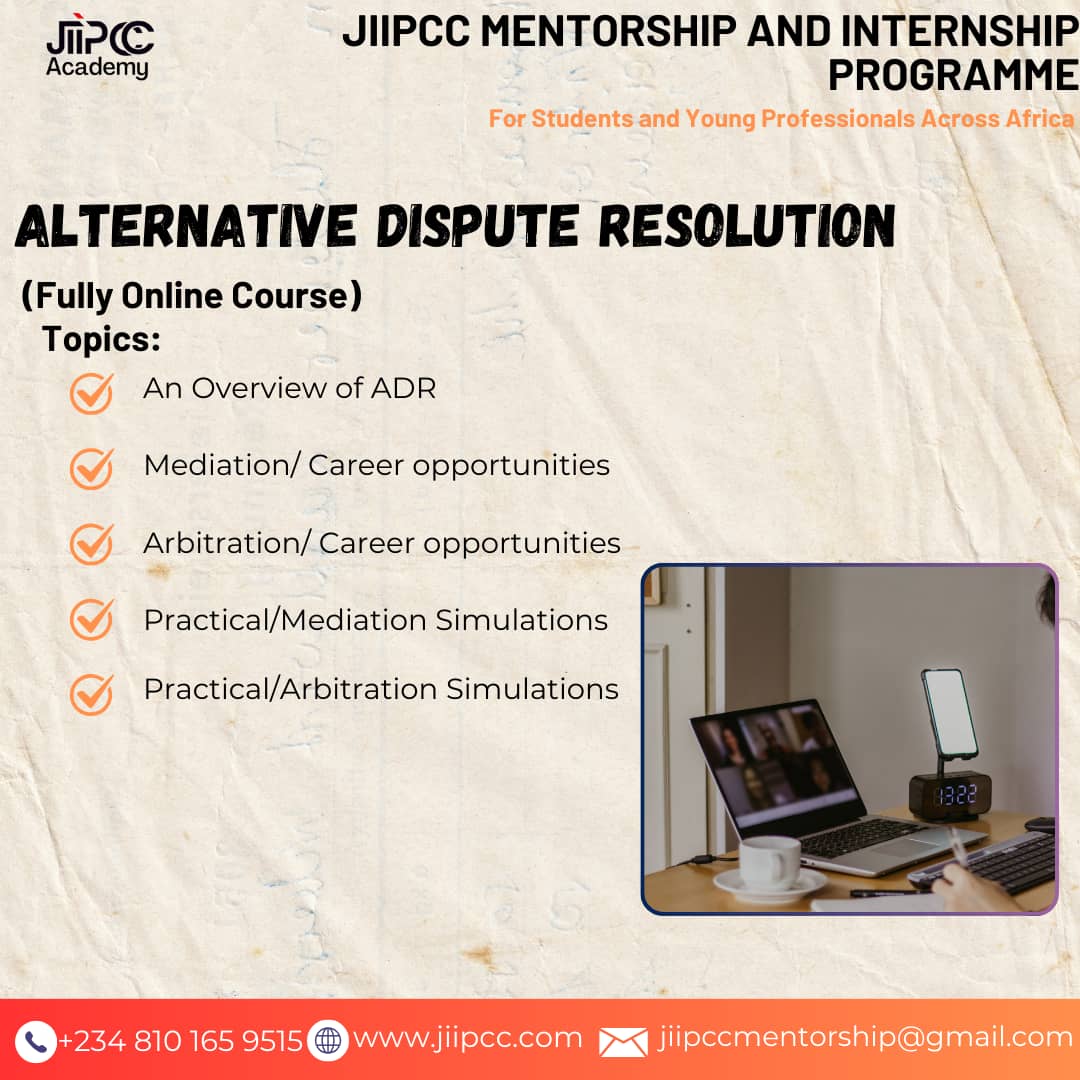
Alternative Dispute Resolution (ADR)
This specialization offers a comprehensive introduction to mechanisms for resolving legal disputes outside of traditional courtroom litigation. With rising cases and the need for efficient resolution systems, ADR has become increasingly relevant in both domestic and international legal frameworks. The course covers the major forms of ADR; mediation, arbitration, negotiation, and conciliation with a particular focus on traditional, commercial and cross-border disputes. Mentees learn about the legal principles governing ADR, including enforceability of agreements, neutrality of facilitators, and procedural fairness. Real-life case studies highlight how ADR functions in various industries, including construction, IP licensing, family law, and international commerce. Special emphasis is placed on drafting arbitration clauses, understanding institutional rules , and applying ethical standards in mediation. Mentees are trained in practical skills such as active listening, neutral language, and interest-based negotiation. The course also explores emerging trends such as online dispute resolution (ODR) and hybrid processes that combine litigation with mediation. By the end, Mentees can confidently evaluate when and how to use ADR, navigate legal frameworks, and advocate for clients in dispute resolution proceedings making them valuable assets in law firms, corporations, and arbitration centers worldwide.
Entertainment Business and Law
This course bridges legal theory with the practical aspects of the entertainment industry, covering film, music, fashion, broadcasting, and digital media. It explores how intellectual property rights, contracts, labor laws, and regulatory frameworks shape the business of entertainment. Mentees are introduced to copyright and trademark protection for creative works, licensing agreements, talent management, and revenue-sharing models such as royalties and syndication. The course dissects deal-making structures from production and distribution agreements to endorsements and merchandising contracts. In today’s digital landscape, mentees also learn about legal challenges posed by streaming platforms, piracy, influencer marketing, and content creation on social media. With globalization, the curriculum compares jurisdictional nuances in entertainment law from Hollywood to Nollywood and Bollywood. Mentees are trained to negotiate contracts, manage risks, and advise artists or companies on rights acquisition, dispute resolution, and legal compliance. Guest lectures and case studies offer insights from industry professionals, emphasizing real-world applications. This specialization equips mentees to play key roles in media law firms, production houses, sports agencies, or as legal advisors to artists and entertainers, blending legal rigor with commercial creativity in one of the world’s fastest-evolving industries.
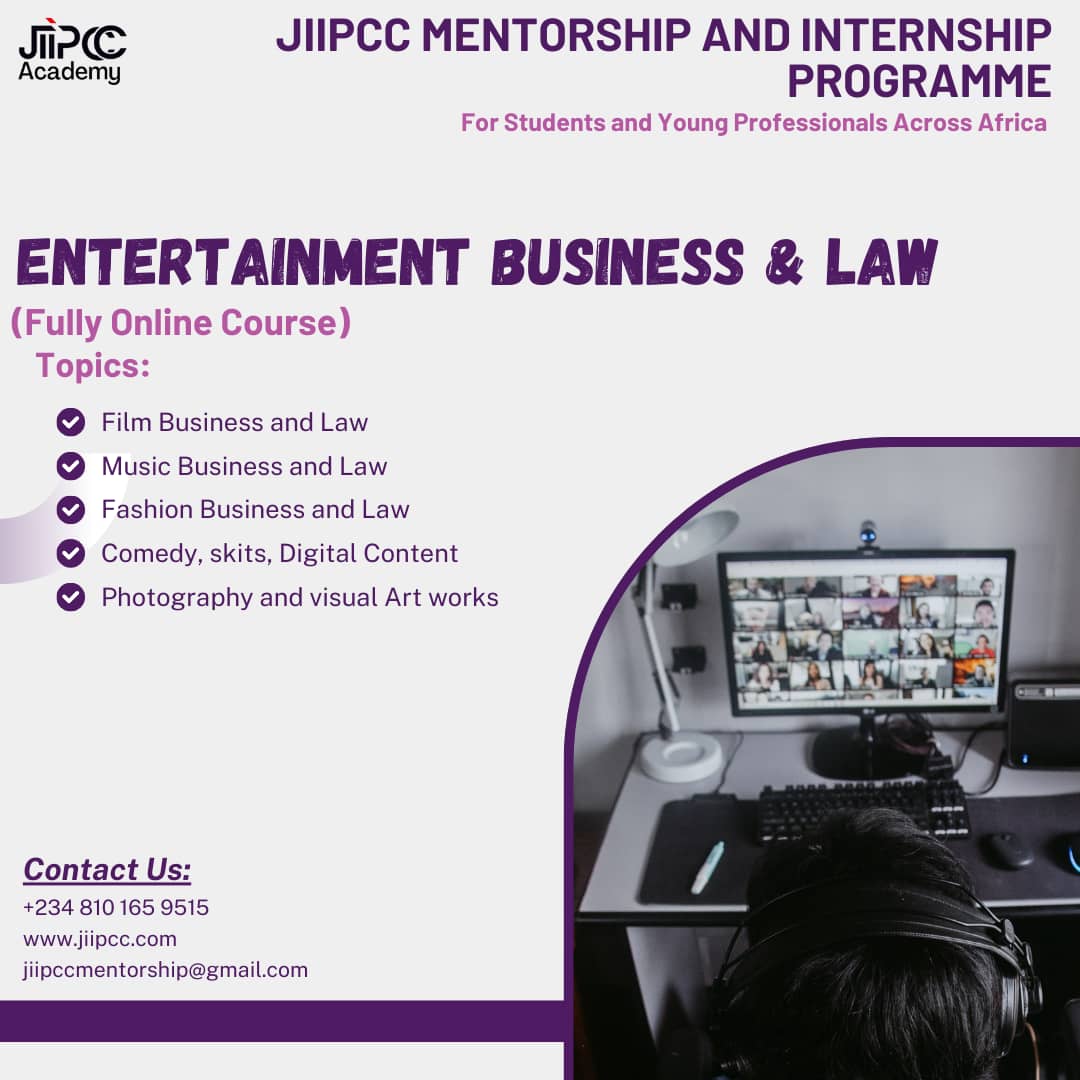
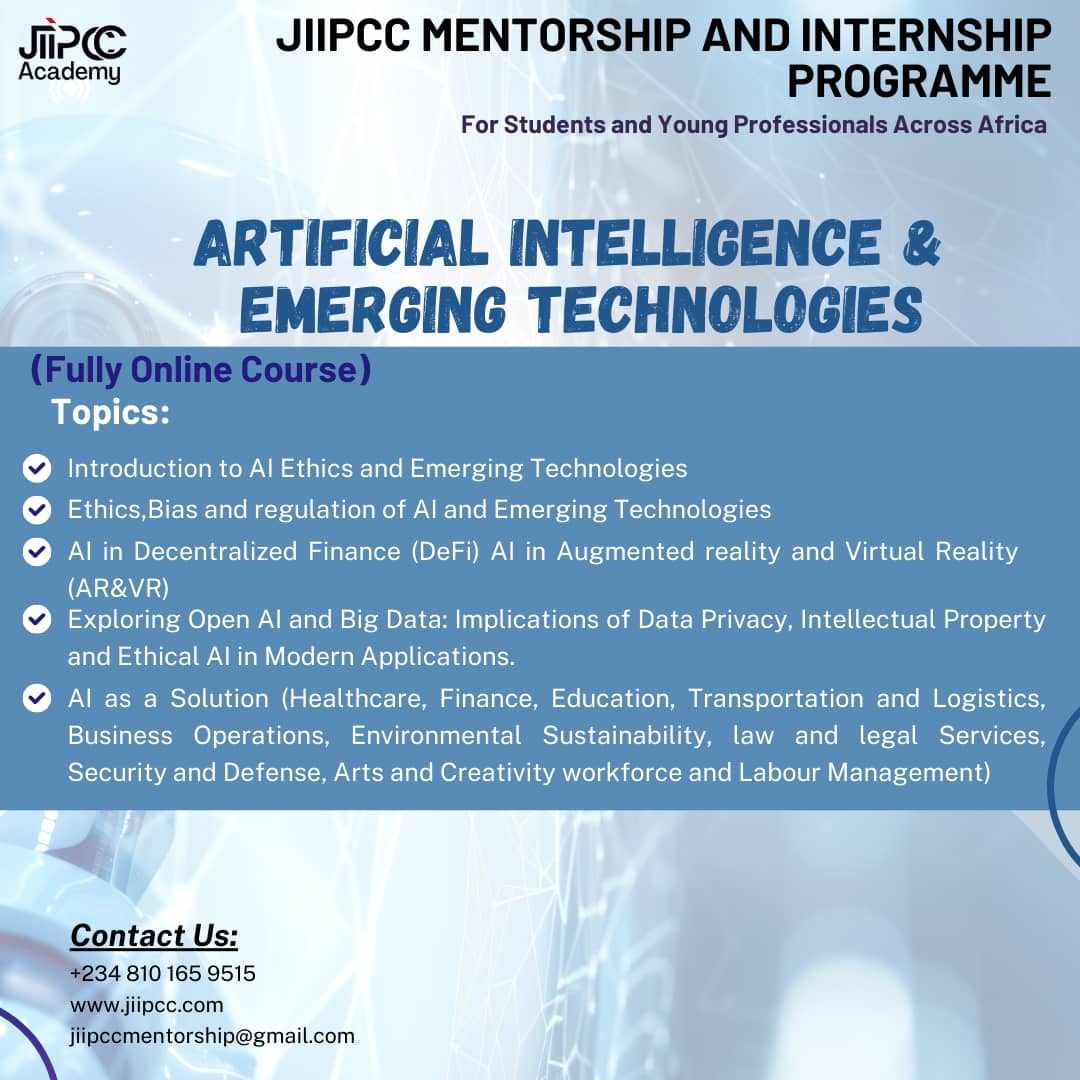
Artificial Intelligence and Emerging Technology
This specialization critically examines the legal and societal implications of Artificial Intelligence (AI) and other frontier technologies, including blockchain, robotics, virtual reality (VR), augmented reality (AR), and the Internet of Things. As innovation outpaces regulation, Mentees engage with core questions about how laws must evolve to address algorithmic accountability, data ownership, liability for autonomous systems, and the ethical deployment of disruptive tech. Topics include intellectual property rights for AI-generated content, contract automation via smart contracts, privacy concerns arising from predictive analytics, and the risks of algorithmic bias. The course explores global policy developments, such as the EU’s AI Act, the OECD AI Principles, and country-specific approaches to regulating AI applications in finance, healthcare, and security. Case studies examine real-world dilemmas like facial recognition, autonomous vehicles, and generative AI tools. Mentees assess governance models and propose frameworks that promote innovation without compromising public interest. By the end of the course, Mentees will be equipped to advise tech firms, regulators, and civil society groups on AI compliance, ethical deployment, and legal risk mitigation, making them invaluable professionals in a world where technology and law are increasingly intertwined.
Patent Drafting
This hands-on specialization equips Mentees with the legal and technical skills necessary for drafting strong, defensible patent applications. Designed for lawyers, inventors, engineers, and researchers, the course delves into the anatomy of a patent focusing on claims, specifications, drawings, and abstracts. Mentees learn how to draft clear and concise claims that meet legal standards while covering the broadest possible scope of protection. The course covers patentability requirements such as novelty, inventive step (non-obviousness), and industrial applicability. Mentees gain familiarity with key global patent systems, including the United States Patent and Trademark Office (USPTO), European Patent Office (EPO), and the World Intellectual Property Organization (WIPO). Real-world exercises include claim drafting for software, pharmaceuticals, mechanical devices, and chemical compounds. The curriculum also teaches strategies for conducting prior art searches, overcoming examiner objections, and responding to office actions. Practical instruction is supplemented with insights into international patent applications under the Patent Cooperation Treaty (PCT) and licensing practices. By the end of the course, Mentees will be capable of drafting professional-quality patent applications and providing strategic advice on patent prosecution, making them vital contributors to innovation-driven sectors.
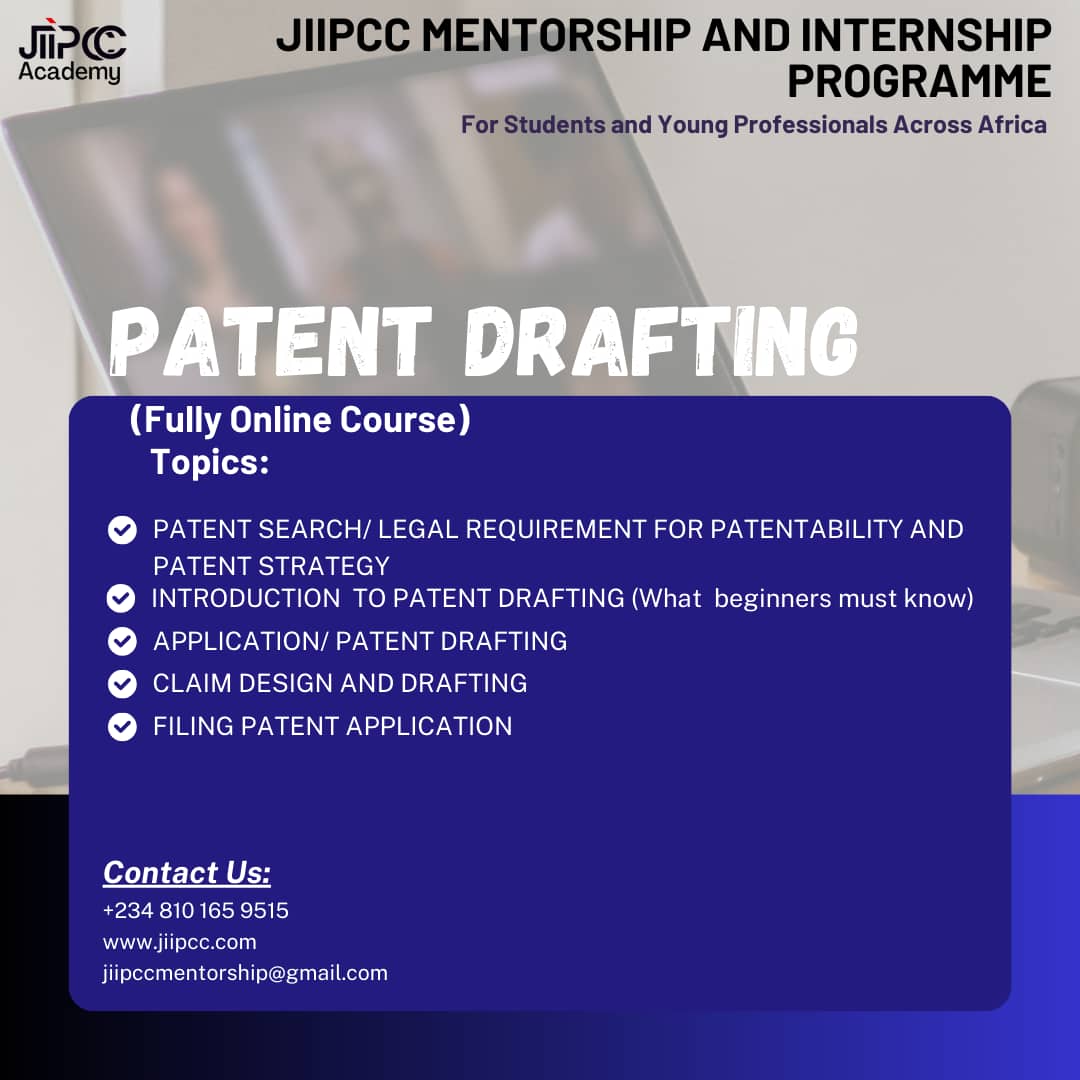
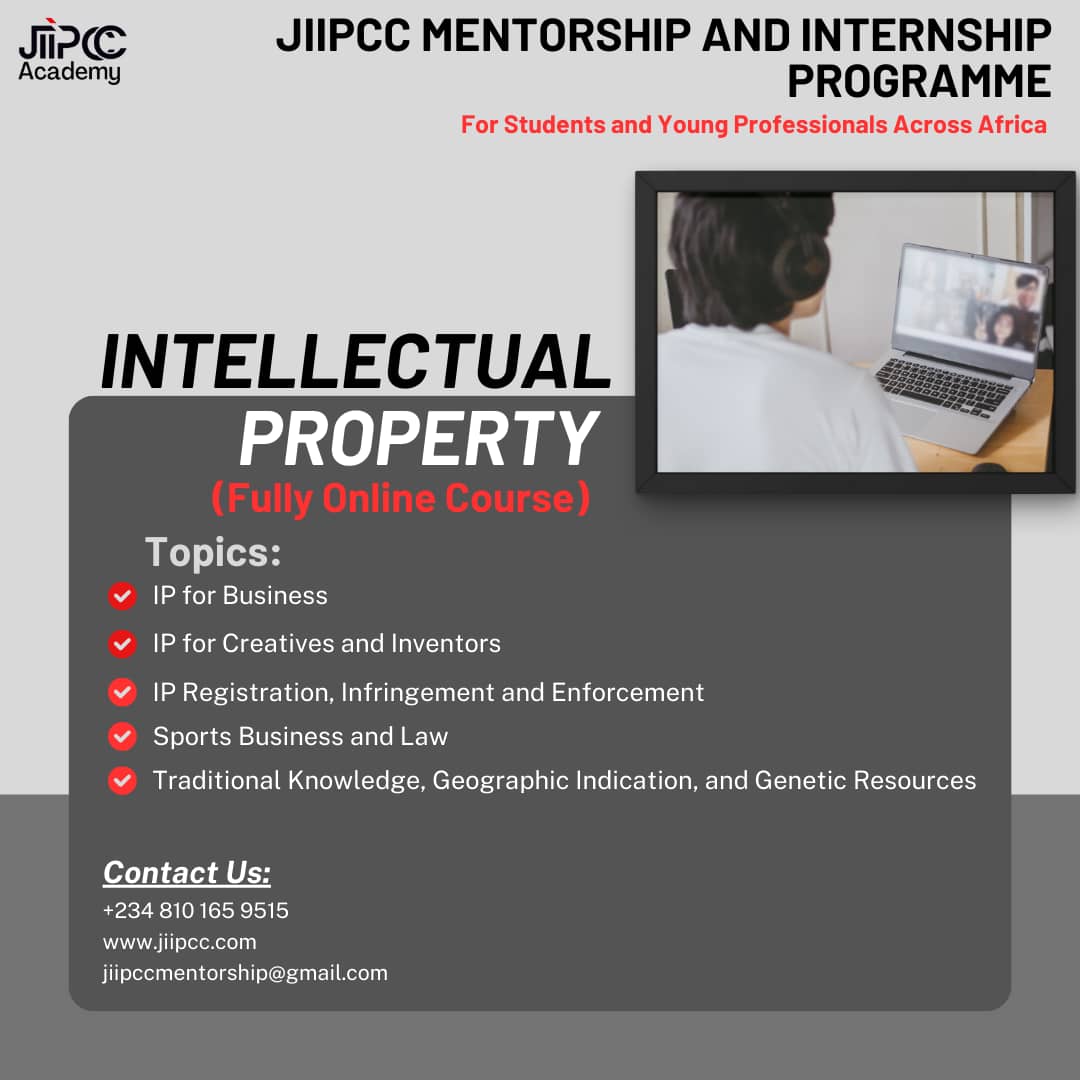
Intellectual Property (IP)
This foundational course provides an in-depth overview of the core areas of Intellectual Property (IP) law patents, trademarks, copyrights, industrial designs, and trade secrets. Mentees learn how IP fuels innovation and creativity while balancing public interest with proprietary rights. The course begins with understanding the role of IP in business, how creatives and inventors can use the mechanism of IP to protect ideas and maximize profit. Through case law, treaties and policy analysis, mentees explore global and regional IP frameworks including communal rights. Key concepts include originality, distinctiveness, infringement, fair use, and IP valuation. The course also examines IP enforcement through litigation, border measures, and alternative dispute resolution. Sectoral analyses include biotechnology, software, fashion, and media. Special topics like IP in digital platforms, open-source licensing, and Indigenous knowledge are also addressed. Mentees gain practical skills in IP registration, portfolio management, and licensing. Mentees will also get to learn the role of intellectual property in Sports including understanding broadcasting rights, dispute resolution mechanism in sports and also profit models adopted by sport agencies. By the end of the course, mentees are well-equipped to work in law firms, corporate legal departments, or policymaking institutions, providing strategic IP advice and helping clients protect and commercialize their intellectual assets.
Fintech Industry
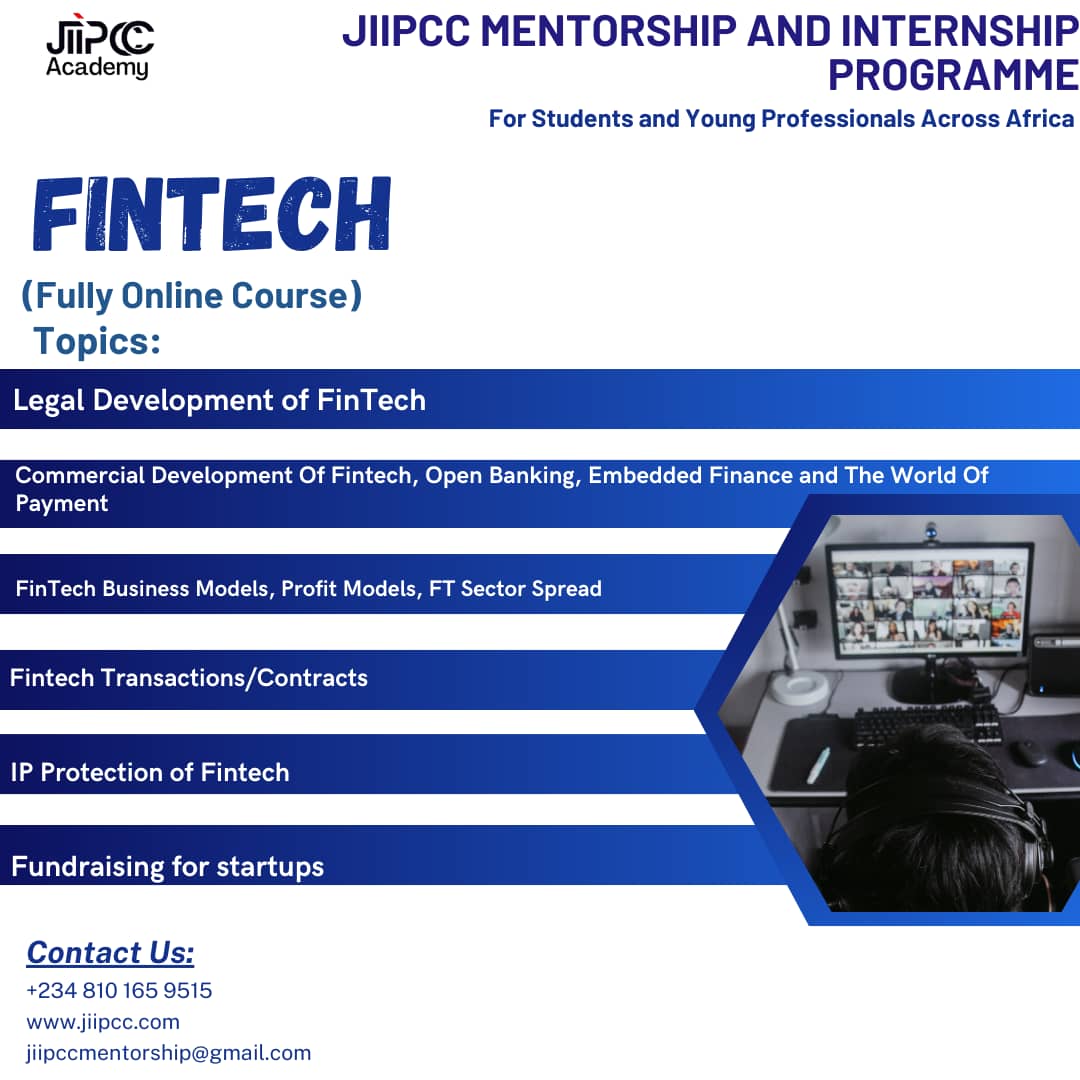
This course explores the legal complexities and innovations driving the Fintech revolution. It covers technologies disrupting traditional finance including blockchain, cryptocurrencies, mobile banking, peer-to-peer lending, robo-advisors, and digital wallets. Mentees analyze the regulatory frameworks surrounding digital financial services, with special attention to anti-money laundering (AML), know-your-customer (KYC), and financial consumer protection laws. Mentees study the rise of decentralized finance (DeFi), stablecoins, central bank digital currencies (CBDCs), and initial coin offerings (ICOs), alongside the regulatory responses from bodies such as the SEC, FCA, and CBN. The course also investigates how smart contracts and AI are reshaping banking, insurance, and investment services. Real-world fintech case studies from regulatory sandboxes to crypto exchange litigation illustrate practical challenges and opportunities. The ethical, cybersecurity, and data privacy implications of fintech solutions are also addressed. By the end of the course, Mentees are prepared to advise fintech startups, financial institutions, and regulators on compliance, innovation, and risk management. This specialization bridges law and finance, offering mentees a competitive edge in one of the fastest-growing sectors in global business.
Energy Industry
This course provides a legal and regulatory roadmap of the dynamic energy sector, including fossil fuels, renewable energy, and emerging clean technologies. It explores how national and international laws govern exploration, production, distribution, and environmental compliance. Mentees examine key agreements and legal instruments related to oil and gas contracts, power purchase agreements, environmental impact assessments, and carbon trading mechanisms. With the energy transition underway, the curriculum integrates climate change mitigation, just transition policies, and sustainable energy law. The role of international organizations (e.g., OPEC, IEA) and investment treaties is also analyzed. Emphasis is placed on balancing energy security, environmental sustainability, and social equity. Real-world case studies cover energy disputes, community rights in resource extraction zones, and regulatory reforms in response to climate goals. Mentees learn to advise stakeholders including governments, investors, and energy companies on legal risks and strategic planning. Graduates are prepared to engage with critical legal issues affecting the energy landscape, including decarbonization, ESG (Environmental, Social, and Governance) compliance, and innovation in energy finance. This specialization is ideal for legal professionals entering one of the world’s most geopolitically and economically significant industries.
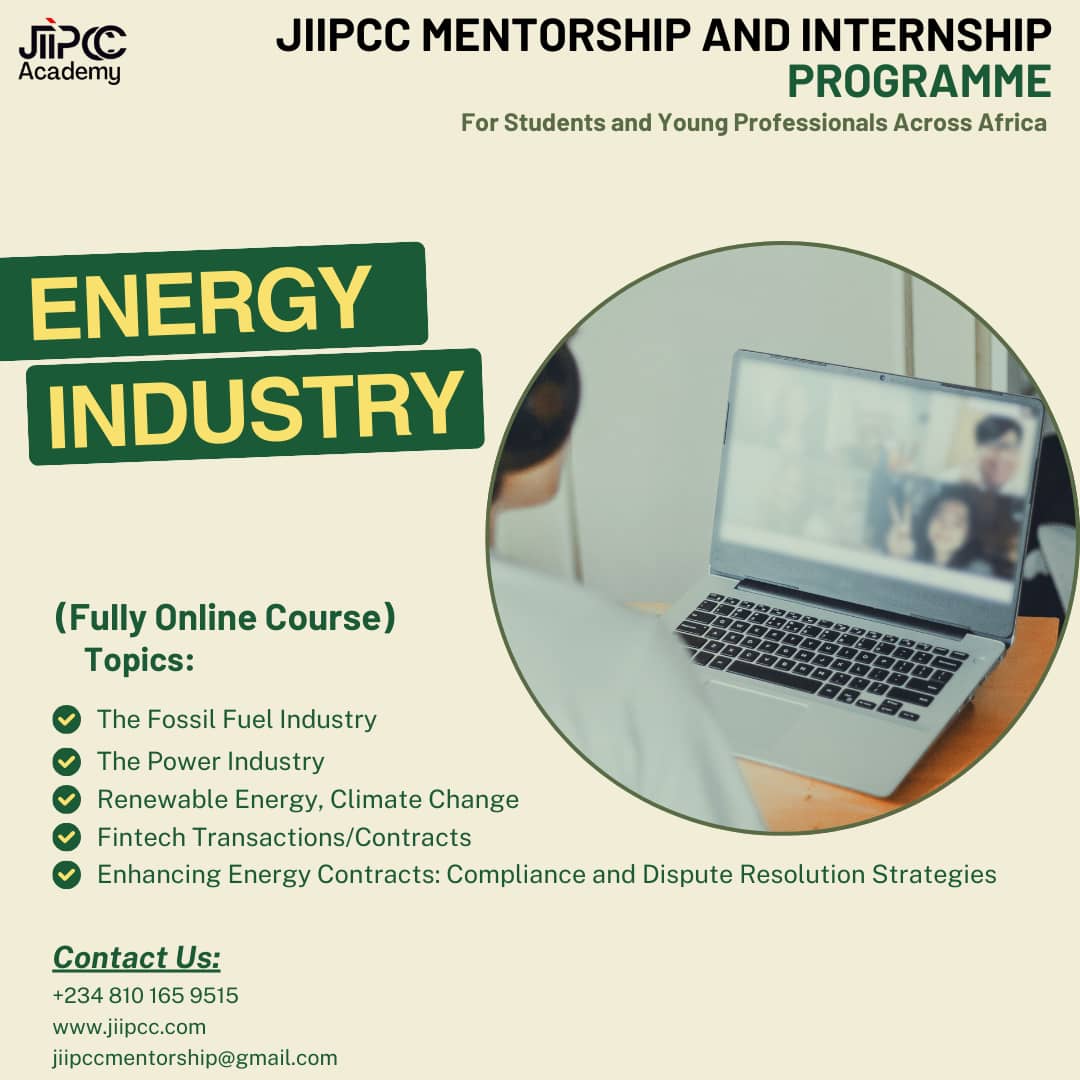
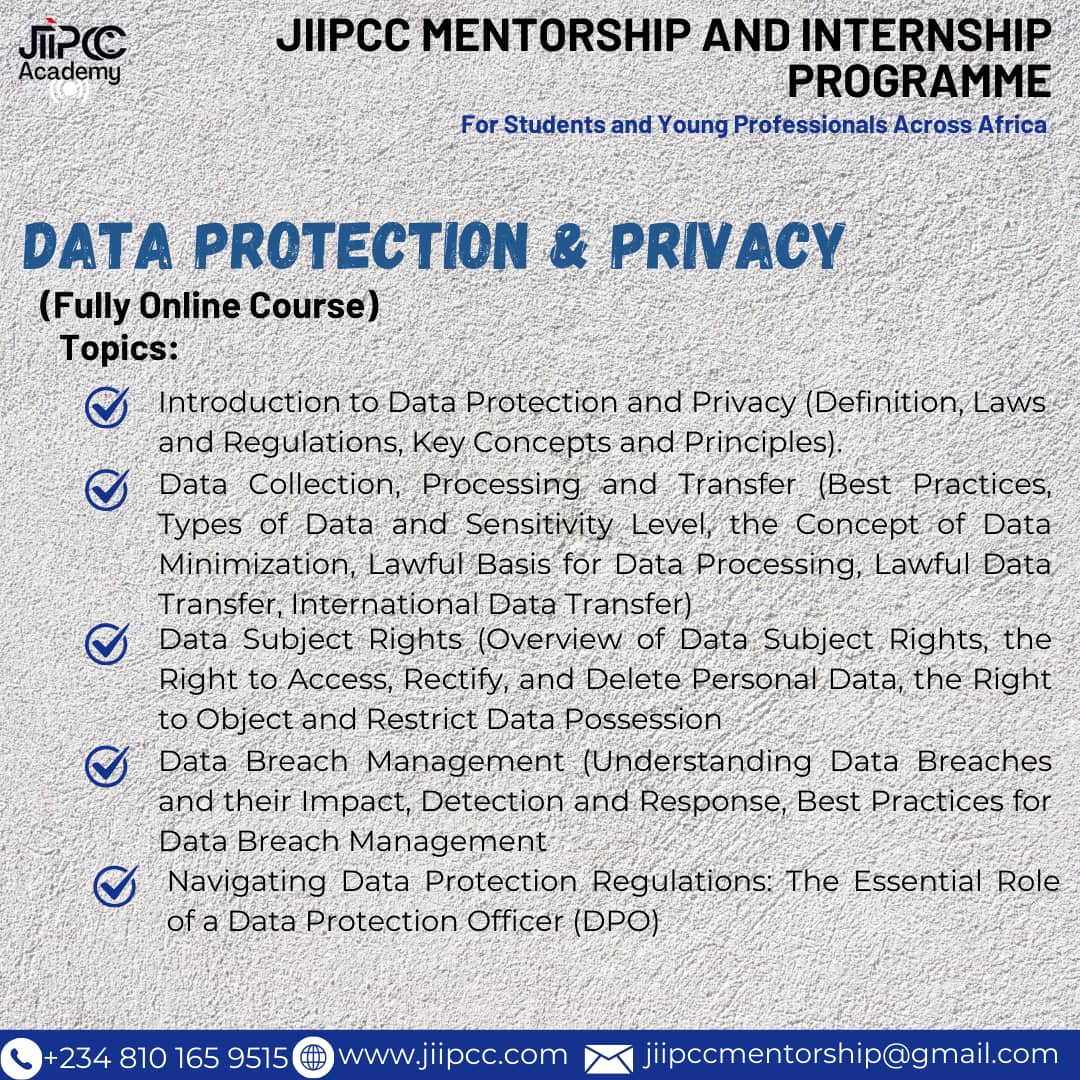
Data Privacy and Protection
This timely specialization addresses the growing importance of data privacy and protection in the digital age. It explores key legal frameworks such as the EU General Data Protection Regulation (GDPR), Nigeria Data Protection Act (NDPA), and other global standards. Mentees gain a deep understanding of personal data, consent, data subject rights, lawful processing bases, and cross-border data transfers. The course teaches practical compliance strategies, including how to conduct Data Protection Impact Assessments (DPIAs), create privacy policies, and implement breach notification protocols. Real-world case studies examine enforcement actions against tech companies, cyber breaches, and evolving trends like AI profiling and biometric data regulation. Mentees are trained to analyze privacy risks in various industries: finance, health, telecoms, education and craft solutions that align with both legal and ethical expectations. The course also explores the role of Data Protection Officers (DPOs), international cooperation on data flows, and emerging jurisprudence on digital rights. Upon completion, mentees will be equipped to help organizations build privacy-by-design systems, navigate complex compliance requirements, and uphold users’ data rights.
Medical Health Tech and Law
This specialization focuses on the intersection of healthcare innovation, emerging technologies, and legal regulation. Mentees explore legal and ethical issues in medical devices, biotechnology, digital health platforms, AI-driven diagnostics, telemedicine, and health data analytics. The course reviews global and local regulatory bodies (e.g., FDA, NAFDAC) and compliance frameworks governing clinical trials, product approvals, and medical advertising. Privacy and cybersecurity are central concerns, especially in handling sensitive health data under laws like HIPAA or the Nigeria Data Protection Act. Ethical discussions include informed consent, access to healthcare, and the use of genetic information. Real-world examples highlight legal challenges faced by health tech startups, such as intellectual property protection, licensing, reimbursement models, and cross-border regulatory hurdles. Mentees also examine the implications of remote care, wearable health devices, and AI symptom checkers on doctor-patient relationships and liability. By the end, learners are equipped to support innovation in healthcare while ensuring patient safety, legal compliance, and ethical integrity. This course is ideal for legal professionals, medtech entrepreneurs, policymakers, and health administrators navigating the complex ecosystem of health technology and law.
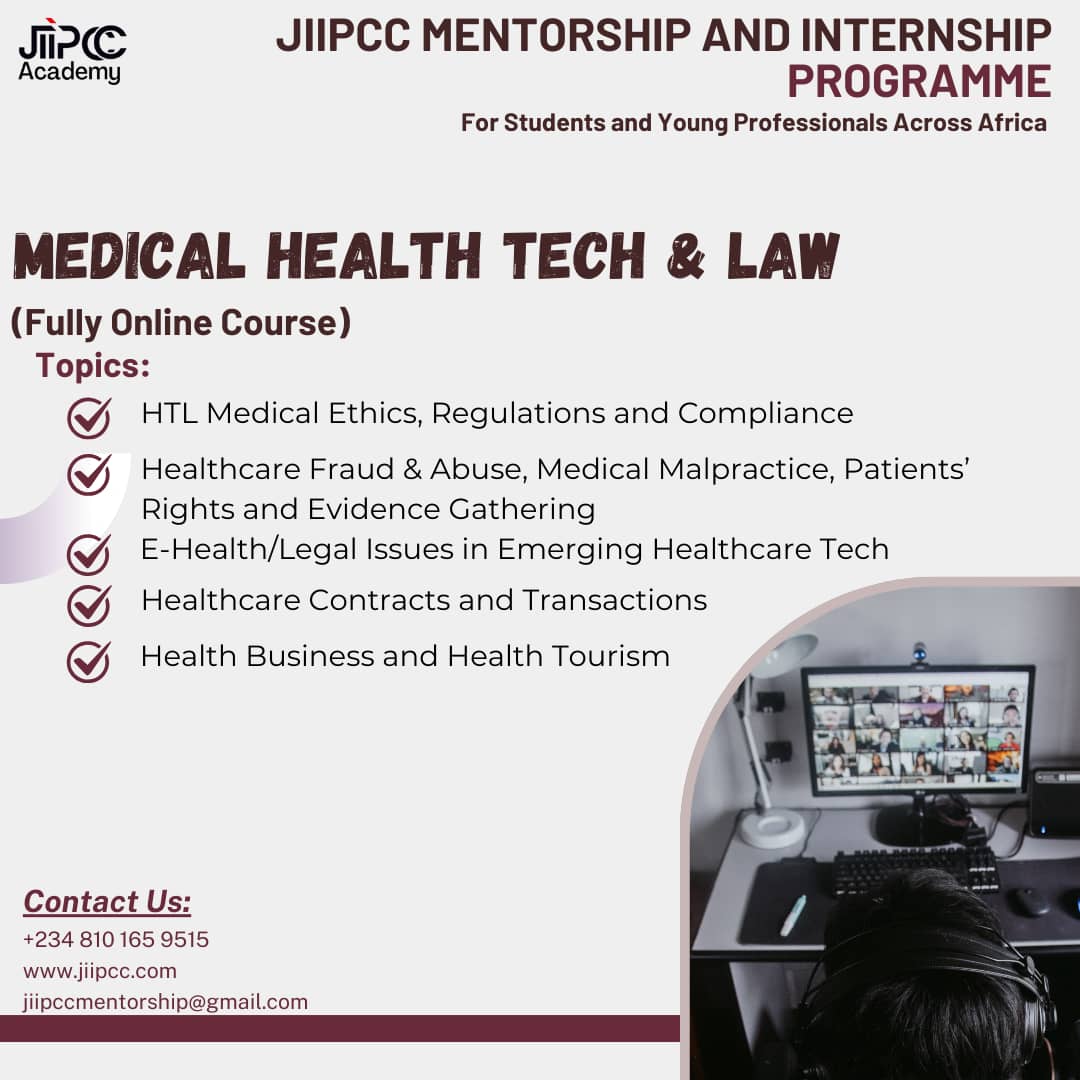
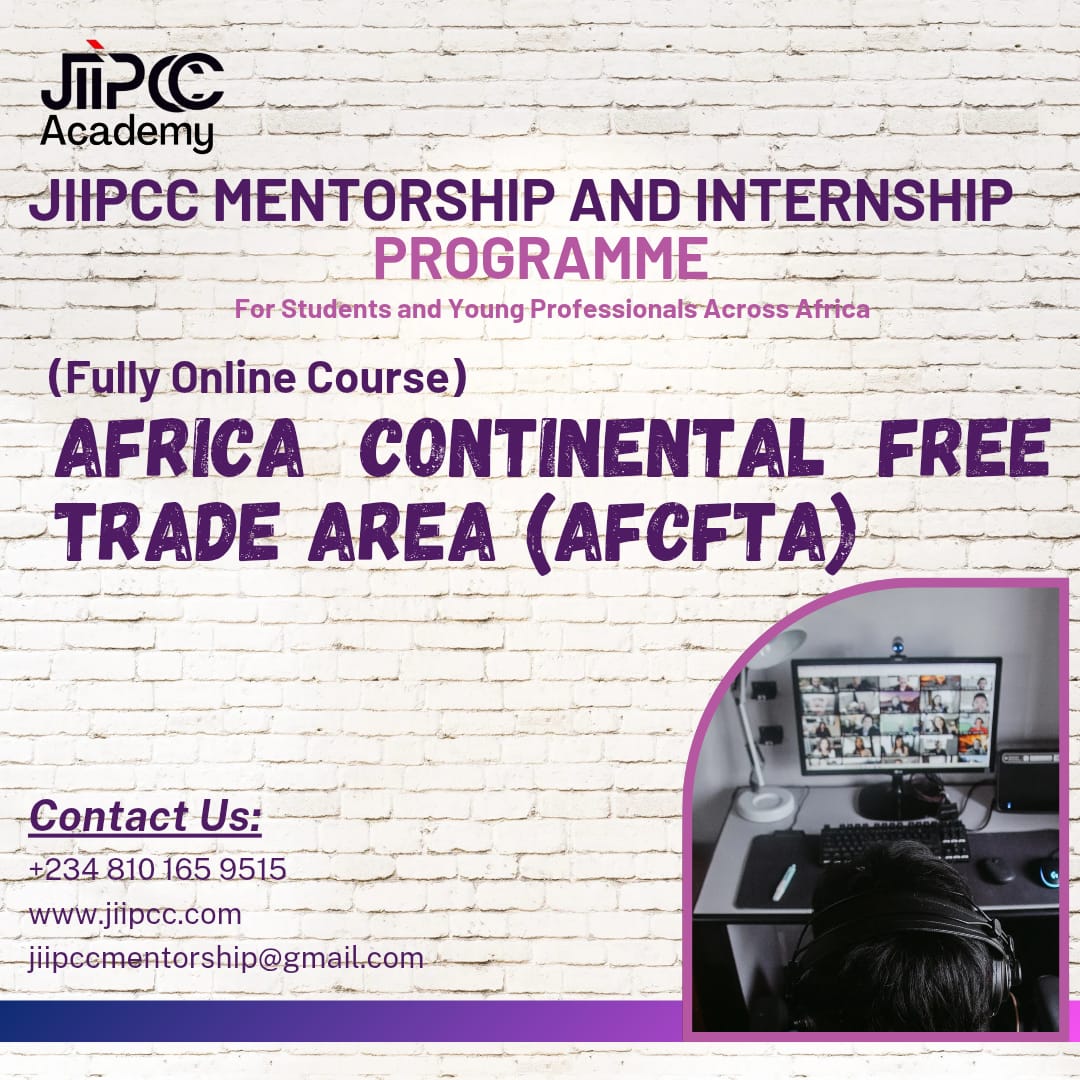
African Continental Free Trade Area (AfCFTA)
This specialization provides a comprehensive understanding of the African Continental Free Trade Area (AfCFTA) and its legal, economic, and policy implications. Mentees will explore the goals, structures, and protocols of AfCFTA, with a focus on trade in goods and services, investment, dispute resolution, and competition policy. The course highlights the role of intellectual property, digital trade, and small businesses in the evolving African trade landscape. Mentees will examine the potential of AfCFTA to transform intra-African commerce, create jobs, and reduce poverty by fostering a unified market of over 1.3 billion people. Case studies will analyze how member states are implementing trade reforms and harmonizing laws to meet AfCFTA commitments. Legal and practical issues such as tariff barriers, rules of origin, and regional economic community overlaps will be critically reviewed. Mentees will be equipped to support businesses, policymakers, and development institutions in leveraging AfCFTA for sustainable growth. This course is ideal for professionals interested in trade law, regional integration, economic development, and pan-African policy implementation.
Human Rights and Business
This specialization examines the intersection of human rights and corporate responsibility in today’s global economy. Mentees will explore how businesses impact human rights and the legal frameworks that govern corporate conduct. Key focus areas include labor rights, environmental justice, corporate accountability, and supply chain ethics. The course covers international standards such as the UN Guiding Principles on Business and Human Rights, the OECD Guidelines, and regional frameworks in Africa. Mentees will learn how to conduct human rights due diligence, assess corporate risks, and develop rights-based compliance strategies. Real-life case studies from industries like mining, agriculture, manufacturing, and tech will offer practical insights into how companies navigate complex ethical challenges. The course also delves into stakeholder engagement, grievance mechanisms, and the role of civil society in corporate oversight. By the end, mentees will be equipped to advise companies, NGOs, and regulators on how to align business operations with human rights principles. This course is ideal for legal practitioners, compliance officers, sustainability professionals, and advocates committed to ethical business practices.
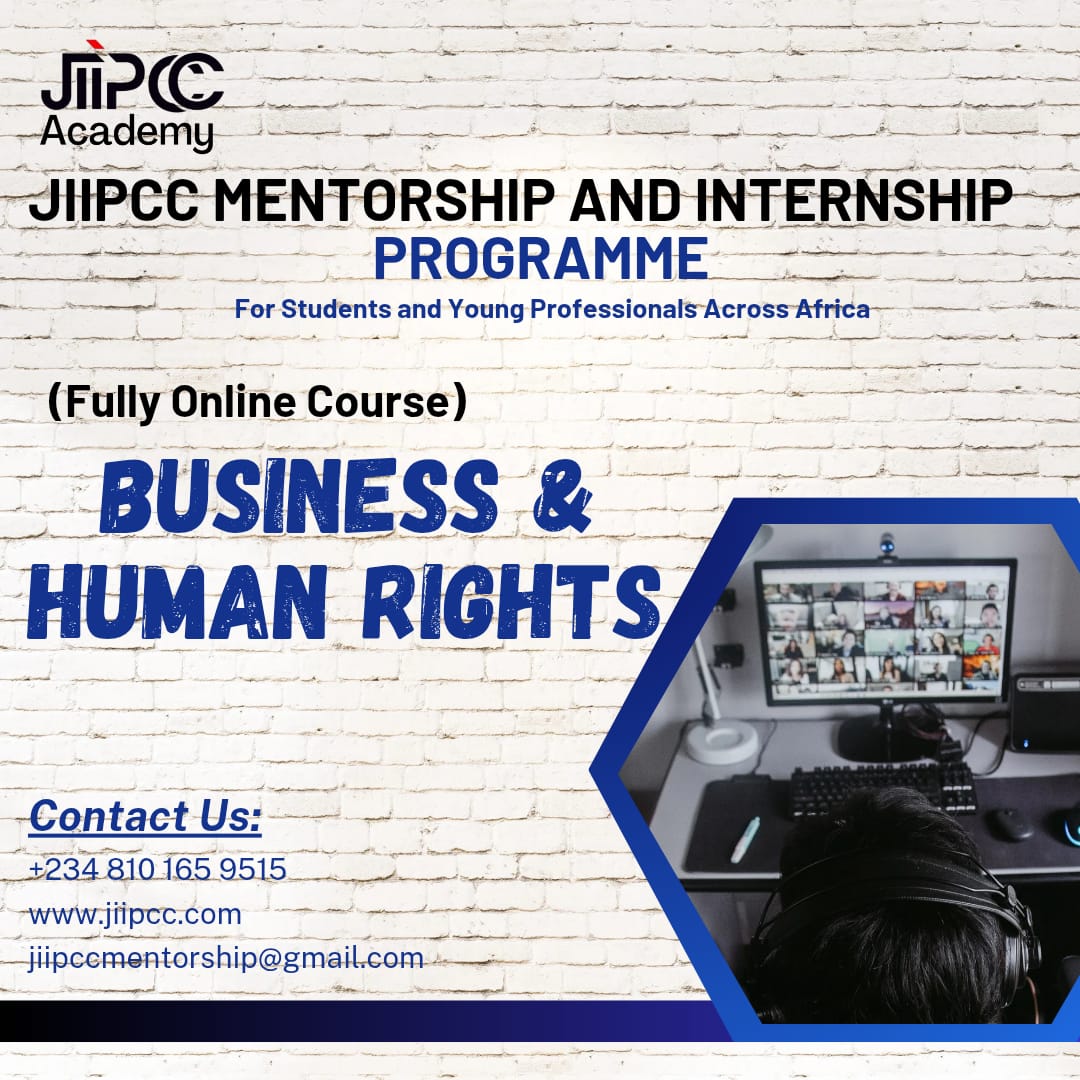
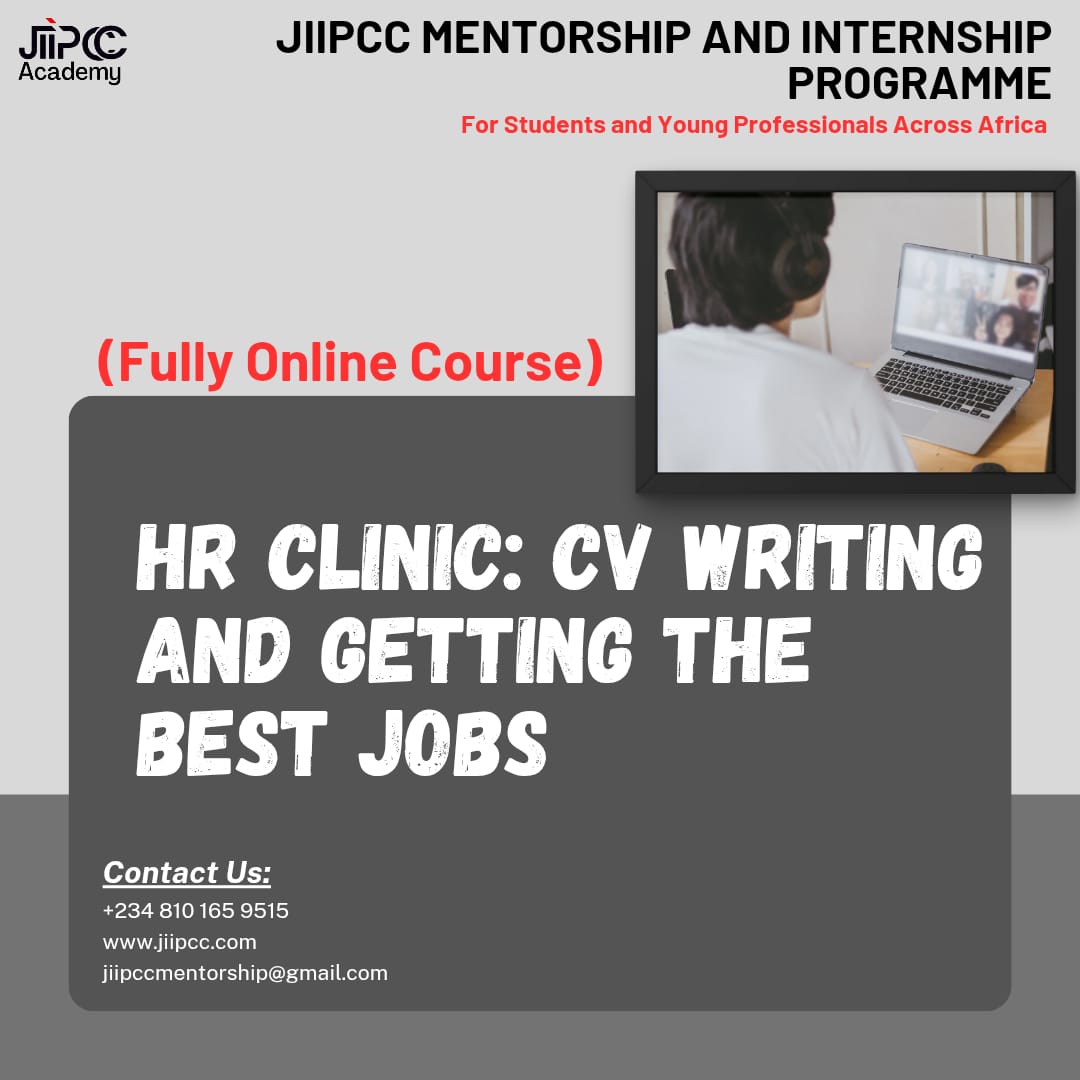
CV Writing and Getting Best Jobs
This practical course empowers Mentees to craft compelling CVs and professional profiles that attract global opportunities. It goes beyond formatting to focus on strategic content development, personal branding, and value articulation. Mentees will learn how to tailor their CVs for different industries and roles, highlighting transferable skills, accomplishments, and impact. The course covers essential tools such as LinkedIn optimization, cover letter writing, and interview preparation. Mentees will be guided through techniques for building career narratives that align with job market expectations and employer preferences. Through real-time reviews, peer feedback, and expert guidance, mentees will refine their documents to stand out in competitive applicant pools. Whether pursuing jobs, internships, scholarships, or graduate school admissions, this course equips Mentees with the confidence and clarity to present their strengths effectively. Special modules also address portfolio design for creatives, statement of purpose writing, and pitching yourself in a digital-first world. By the end of the course, mentees will have a professional CV, personal brand story, and practical job-search strategies tailored to their career goals.
Join the group of students from all over the world
100%
© 2025 JIIPCC | All Rights Reserved | Powered by ARGONSEAL CONSULTING
